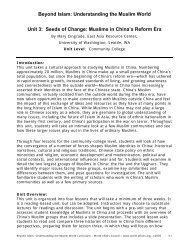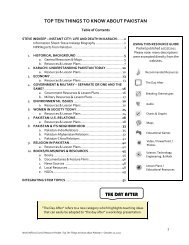If King Tut Could Talk - World Affairs Council
If King Tut Could Talk - World Affairs Council
If King Tut Could Talk - World Affairs Council
- No tags were found...
You also want an ePaper? Increase the reach of your titles
YUMPU automatically turns print PDFs into web optimized ePapers that Google loves.
Timeline of the Arab SpringCommon Core ConnectionTHE DAY AFTERActivity: This timeline ends with Qaddafi’s death. Have students work together in small groups or as aclass to research and update the timeline to reflect more current events. Encourage the use of photos,drawings, or cartoons, and allow the timeline to “grow” on the wall as history unfolds.17th December 2010: TUNISIA: Mohammed Bouazizi, a Tunisian vegetable peddler sets himself ablazein the town of Sidi Bouzid after his cart is confiscated by a policewoman who slapped him and spat in hisface. The incident causes long-simmering frustrations over injustice, poverty, and the greed of thepolitical elite to spill over into protests, which are brutally subdued. Bouazizi dies, but in his act of selfimmolation,the Arab Spring is born.14th January, 2011: TUNISIA. After nearly a month of protests, and with public anger mounting overthe increasingly violent response of the security forces, Zine El Abidine Ben Ali flees the country he hadruled for 24 years after senior generals tell him his position is untenable. His hated wife, Leila Trabelsi,escapes too – allegedly taking much of the central bank's gold reserves with her.11th February, 2011: EGYPT: Hosni Mubarak becomes the second leader forced from office after 30years in power. Protests in the wake of Tunisia's revolt have spread through much of the Arab world, butnone gain traction as quickly as in Egypt. Hundreds of protesters die at the hands of the security forcesuntil the army steps in and urges Mubarak to go, prompting wild celebrations in Cairo's Tahrir Square.15th February, 2011: LIBYA: Protests that erupt in the east after the arrest of human rights lawyersquickly turn violent after the Qaddafi regime responds with massive force. Within three days, oppositionsupporters are in control of the second city of Benghazi and the government sees massive defections.14th March, 2011: BAHRAIN: Saudi Arabia and Gulf states send troops into Bahrain to prop up the SunniAl Khalifa monarchy after an uprising by the kingdom's subjugated Shia majority. Dozens of protestersare killed but the West, which has vital, Iran-related security interests on the island, is subdued in itscriticism and the revolt is quelled.17th March 2011: LIBYA: The UN Security <strong>Council</strong> passes a resolution imposing a no-fly zone over Libyaas Qaddafi's forces close in on Benghazi and the regime appears to threaten mass reprisals. Two dayslater, Nato warplanes and ships begin to bombard army positions.18th March 2011: SYRIA: Government forces kill five protesters in the southern city of Deraa, markingthe beginning of an uprising against President Bashar al-Assad. By October, 3,000 people lie dead andfears of a civil war mount but Assad clings on amid divisions in the international community.3rd June 2011: YEMEN: President Ali Abdullah Saleh is wounded in a bombing on his palace in thecapital Sana'a. The attack comes after widespread protests, the killing of hundreds of demonstrators andviolent battles between army loyalists and defectors. Saleh is evacuated for treatment in Saudi Arabiabut confounds expectations by returning to Yemen, where he repeats promises to resign that fewbelieve.3rd August 2011: EGYPT: The country's army rulers bow to mounting public pressure by putting HosniMubarak on trial. The former dictator is wheeled into court on a stretcher, accompanied by his two hatedsons. Arabs across the Middle East watch the spectacle in wonder and pride.21st August 2011: LIBYA: Libyan rebels take the capital city Tripoli with surprising ease after months ofnear stalemate and with international criticism of Nato's bombing campaign mounting. But the Qaddafifamily flees and the dictator's birthplace of Sirte stubbornly holds out against the rebels.20th October 2011: LIBYA: Colonel Qaddafi killed in Sirte.http://www.telegraph.co.uk/news/worldnews/africaandindianocean/libya/8839143/Arab-Spring-timeline-of-the-African-and-Middle-East-rebellions.html<strong>World</strong> <strong>Affairs</strong> <strong>Council</strong> Resource Packet: Pacific Science Center Presents—The Golden <strong>King</strong> and the Great Pharaoh: November 1, 201233











